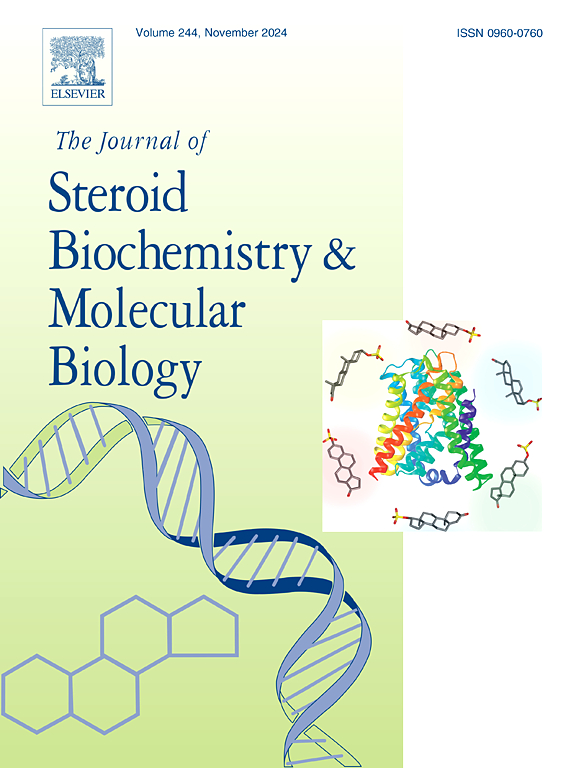植物甾醇作为阿尔茨海默病肠脑轴和神经炎症的调节剂:衰老研究的新治疗途径
IF 2.5
2区 生物学
Q3 BIOCHEMISTRY & MOLECULAR BIOLOGY
Journal of Steroid Biochemistry and Molecular Biology
Pub Date : 2025-07-16
DOI:10.1016/j.jsbmb.2025.106836
引用次数: 0
摘要
阿尔茨海默病(AD)以淀粉样蛋白-β沉积和神经炎症为特征。新出现的证据表明,肠道菌群失调和肠-脑轴功能障碍在阿尔茨海默病的发病机制中,而植物甾醇-类似于胆固醇的植物甾醇-调节微生物群组成、脂质代谢和炎症途径。回顾植物甾醇作为AD患者肠-脑轴和神经炎症调节剂的证据,概述其机制、治疗潜力和给药途径。PubMed, Scopus和Web of Science的文献检索确定了植物甾醇,肠道微生物群调节,神经炎症和AD的研究。提取并合成了有关甾醇结构-活性关系、微生物衍生代谢物和体内AD结果的机制数据。植物甾醇降低全身胆固醇,穿过血脑屏障,并在神经组织中积累。它们丰富了产生短链脂肪酸的肠道微生物,抑制了病原体,增加了激活FXR和TGR5信号的次级胆汁酸,减轻了神经炎症。临床前AD模型显示淀粉样蛋白-β减少,小胶质细胞激活减少,认知能力改善。纳米胶囊化和酯化策略提高中枢神经系统的生物利用度。植物甾醇通过FXR-和tgr5介导的信号通路调节胆固醇、肠道菌群和神经炎症通路。先进的给药系统和微生物组信息的给药策略可以提高它们的治疗精度和摄取。未来的研究应侧重于分层人体试验,以验证阿尔茨海默病的疗效,并实现个性化干预。本文章由计算机程序翻译,如有差异,请以英文原文为准。
Phytosterols as modulators of gut-brain axis and neuroinflammation in Alzheimer’s disease: A novel therapeutic avenue in aging research
Alzheimer’s disease (AD) is characterized by amyloid-β deposition and neuroinflammation. Emerging evidence implicates gut microbiota dysbiosis and gut–brain axis dysfunction in AD pathogenesis, while phytosterols—plant sterols similar to cholesterol—modulate microbiota composition, lipid metabolism, and inflammatory pathways. To review evidence of phytosterols as modulators of the gut–brain axis and neuroinflammation in AD, outlining mechanisms, therapeutic potential, and delivery approaches. A literature search of PubMed, Scopus, and Web of Science identified studies on phytosterols, gut microbiota modulation, neuroinflammation, and AD. Mechanistic data on sterol structure–activity relationships, microbiota-derived metabolites, and in vivo AD outcomes were extracted and synthesized. Phytosterols lower systemic cholesterol, cross the blood–brain barrier, and accumulate in neural tissue. They enrich short-chain fatty acid–producing gut microbes, suppress pathogens, and increase secondary bile acids that activate FXR and TGR5 signaling, attenuating neuroinflammation. Preclinical AD models show reduced amyloid-β, decreased microglial activation, and improved cognition. Nanoencapsulation and esterification strategies enhance CNS bioavailability. Phytosterols modulate cholesterol, gut microbiota, and neuroinflammatory pathways through FXR- and TGR5-mediated signaling. Advanced delivery systems and microbiome-informed dosing strategies may enhance their therapeutic precision and uptake. Future studies should focus on stratified human trials to validate efficacy and enable personalized interventions in Alzheimer’s disease.
求助全文
通过发布文献求助,成功后即可免费获取论文全文。
去求助
来源期刊
CiteScore
8.60
自引率
2.40%
发文量
113
审稿时长
46 days
期刊介绍:
The Journal of Steroid Biochemistry and Molecular Biology is devoted to new experimental and theoretical developments in areas related to steroids including vitamin D, lipids and their metabolomics. The Journal publishes a variety of contributions, including original articles, general and focused reviews, and rapid communications (brief articles of particular interest and clear novelty). Selected cutting-edge topics will be addressed in Special Issues managed by Guest Editors. Special Issues will contain both commissioned reviews and original research papers to provide comprehensive coverage of specific topics, and all submissions will undergo rigorous peer-review prior to publication.

 求助内容:
求助内容: 应助结果提醒方式:
应助结果提醒方式:


